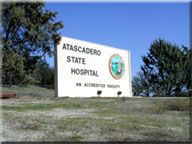CA State Hospitals flout legislative process
May 22, 2013
By Katy Grimes
SACRAMENTO — The Department of State Hospitals appears to be flouting the legislative process. Instead of getting legislative approval for a $50 million expansion, they’ve been implementing the changes since February, and just now asked for approval.
A seemingly routine committee hearing about the massive amounts of spending by the equally massive Department of Health and Human Services proved to be just the opposite on Tuesday. When it became obvious that the Department of State Hospitals (formerly the Department of Mental Health) was already moving ahead with hiring new employees and new program plans without approval from the Legislature, tempers flared.
It’s not good to bypass the Legislature.
State hospitals: patients or inmates?
The state hospitals agency operates five hospitals in California: Atascadero State Hospital, Coalinga State Hospital, Metropolitan State Hospital, Napa State Hospital and Patton State Hospital. Each hospital provides inpatient treatment for the seriously mentally ill.
Additionally, the department runs two correctional facilities: Vacaville Psychiatric Program and Salinas Valley Psychiatric Program. About 92 percent of the 6,370 patients in the state hospital population are incarcerated under the California Corrections system. Some are low-level criminal offenders, some are sexually violent predators and others are referrals from prisons. The remainder are severely mentally ill, but not criminals.
Spending without approval
The state hospitals department was asking for approval for 21 positions to change from contracted positions to official state civil service positions. This is hardly unusual state business. But the State Hospital’s proposed budget for Fiscal Year 2013-14 totals $1.58 billion, a 9.7 percent increase of $139.6 million over the 2012-13 budget year.
Legislative Analyst Shawn Martin said this was the first he had heard about the request. He asked, “I am wondering why this was not addressed in the January budget” proposed by Gov. Jerry Brown.
Committee Chairman, Sen. Bill Monning, D-Carmel, wondered the same. “I am perplexed why we are just now hearing about this,” he said, directing comments to the state hospital representative.
“We didn’t have the time or the resources to deal with it,” the hospitals rep said.
This only made Monning more angry. “We have to be suspect when the May Revise is the vehicle used to add $50 million to a budget,” Monning said. “This is an end-run on the Legislature. Even a heads up this was coming down the pike would have shown a little more respect.”
With Brown’s May Budget Revision just released last week, the LAO did not have sufficient time to analyze the spending proposal from the state hospitals agency. And it was clear from Monning’s comments that this new proposal should not have been allowed into the budget revision, and was supposed to have been in the January budget.
How did this happen?
In January, agencies submit their budgets to the Department of Finance. If there are policy changes in the ensuing months, by April they must submit a letter to the department notifying and explaining the changes, along with cost estimates and proposals. This is what goes into the May Revision.
But if the changes are just technical, they can go directly into the May Revision. Technical changes usually involve case load adjustments within the state hospitals.
In the case of the Department of State Hospitals, someone in the finance department felt the changes were technical, while the LAO and the Senate subcommittee believe these changes are significant policy changes.
What policy changes?
The Department of State Hospitals agency wants to create an office to centralize information for all of the hospitals and create 19 positions. This appears to be a significant policy change, not just shifting case loads.
Additionally, the agency wants to expand the number of beds at five of the state hospitals. And they’ve already started doing it without legislative approval.
In fact, the Legislature had no idea the Department of State Hospitals had been ramping up and filling the positions — since February. “We should be a partner and not an afterthought in your budget planning,” Monning said.
What now?
The Department of Finance approved the addition of the state hospitals changes in the May Budget Revision. Carla Castaneda with the Department of Finance explained to me that its Budget Letters set out the criteria for what to do with agency changes.
Budget Letter 13-01 and Budget Letter 13-03 set out the criteria for which the department approved the changes to the state hospitals budget. They felt these were workload issues.
The Senate Subcommittee can do a couple of things. They held all of the items from the Department of State Hospitals open, and did not vote on them Tuesday. If they choose to not vote on them, it’s a rejection of the budget proposals.
Or they can approve the items one at a time, once they have the proper analysis.
There will be more hearings this week on these issues. Should the committee just not do anything on the open items, it would be a denial by default.
Related Articles
Pentagon halts CA National Guard repayment demands
Reeling from outrage over a costly bureaucratic misstep, the Pentagon has halted its efforts to force California National Guardsmen to personally
CA’s economic funk: ‘Regulators gone wild’ take their toll
For Sunday’s U-T San Diego, I did an essay about how California went from being the world pioneer in sensible
Liberals inflicted Filner on San Diego
As San Diego once again becomes a national punchline — this time for its lecherous dirty old man of a





